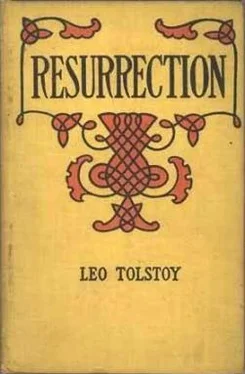Leo Tolstoy - Resurrection
Здесь есть возможность читать онлайн «Leo Tolstoy - Resurrection» весь текст электронной книги совершенно бесплатно (целиком полную версию без сокращений). В некоторых случаях можно слушать аудио, скачать через торрент в формате fb2 и присутствует краткое содержание. Жанр: Русская классическая проза, на английском языке. Описание произведения, (предисловие) а так же отзывы посетителей доступны на портале библиотеки ЛибКат.
- Название:Resurrection
- Автор:
- Жанр:
- Год:неизвестен
- ISBN:нет данных
- Рейтинг книги:4 / 5. Голосов: 1
-
Избранное:Добавить в избранное
- Отзывы:
-
Ваша оценка:
- 80
- 1
- 2
- 3
- 4
- 5
Resurrection: краткое содержание, описание и аннотация
Предлагаем к чтению аннотацию, описание, краткое содержание или предисловие (зависит от того, что написал сам автор книги «Resurrection»). Если вы не нашли необходимую информацию о книге — напишите в комментариях, мы постараемся отыскать её.
Resurrection — читать онлайн бесплатно полную книгу (весь текст) целиком
Ниже представлен текст книги, разбитый по страницам. Система сохранения места последней прочитанной страницы, позволяет с удобством читать онлайн бесплатно книгу «Resurrection», без необходимости каждый раз заново искать на чём Вы остановились. Поставьте закладку, и сможете в любой момент перейти на страницу, на которой закончили чтение.
Интервал:
Закладка:
“And is this all?” Nekhludoff suddenly exclaimed aloud, and the inner voice of the whole of his being said, “Yes, it is all.” And it happened to Nekhludoff, as it often happens to men who are living a spiritual life. The thought that seemed strange at first and paradoxical or even to be only a joke, being confirmed more and more often by life’s experience, suddenly appeared as the simplest, truest certainty. In this way the idea that the only certain means of salvation from the terrible evil from which men were suffering was that they should always acknowledge themselves to be sinning against God, and therefore unable to punish or correct others, because they were dear to Him. It became clear to him that all the dreadful evil he had been witnessing in prisons and jails and the quiet self-satisfaction of the perpetrators of this evil were the consequences of men trying to do what was impossible; trying to correct evil while being evil themselves; vicious men were trying to correct other vicious men, and thought they could do it by using mechanical means, and the only consequence of all this was that the needs and the cupidity of some men induced them to take up this so-called punishment and correction as a profession, and have themselves become utterly corrupt, and go on unceasingly depraving those whom they torment. Now he saw clearly what all the terrors he had seen came from, and what ought to be done to put a stop to them. The answer he could not find was the same that Christ gave to Peter. It was that we should forgive always an infinite number of times because there are no men who have not sinned themselves, and therefore none can punish or correct others.
“But surely it cannot be so simple,” thought Nekhludoff, and yet he saw with certainty, strange as it had seemed at first, that it was not only a theoretical but also a practical solution of the question. The usual objection, “What is one to do with the evil doers? Surely not let them go unpunished?” no longer confused him. This objection might have a meaning if it were proved that punishment lessened crime, or improved the criminal, but when the contrary was proved, and it was evident that it was not in people’s power to correct each other, the only reasonable thing to do is to leave off doing the things which are not only useless, but harmful, immoral and cruel.
For many centuries people who were considered criminals have been tortured. Well, and have they ceased to exist? No; their numbers have been increased not alone by the criminals corrupted by punishment but also by those lawful criminals, the judges, procureurs, magistrates and jailers, who judge and punish men. Nekhludoff now understood that society and order in general exists not because of these lawful criminals who judge and punish others, but because in spite of men being thus depraved, they still pity and love one another.
In hopes of finding a confirmation of this thought in the Gospel, Nekhludoff began reading it from the beginning. When he had read the Sermon on the Mount, which had always touched him, he saw in it for the first time to-day not beautiful abstract thoughts, setting forth for the most part exaggerated and impossible demands, but simple, clear, practical laws. If these laws were carried out in practice (and this was quite possible) they would establish perfectly new and surprising conditions of social life, in which the violence that filled Nekhludoff with such indignation would cease of itself. Not only this, but the greatest blessing that is obtainable to men, the Kingdom of Heaven on Earth would be established. There were five of these laws.
The first (Matt. v. 21-26), that man should not only do no murder, but not even be angry with his brother, should not consider any one worthless: “Raca,” and if he has quarrelled with any one he should make it up with him before bringing his gift to God—i.e., before praying.
The second (Matt. v. 27-32), that man should not only not commit adultery but should not even seek for enjoyment in a woman’s beauty, and if he has once come together with a woman he should never be faithless to her.
The third (Matt. 33-37), that man should never bind himself by oath.
The fourth (Matt. 38-42), that man should not only not demand an eye for an eye, but when struck on one cheek should hold out the other, should forgive an offence and bear it humbly, and never refuse the service others demand of him.
The fifth (Matt. 43-48), that man should not only not hate his enemy and not fight him, but love him, help him, serve him.
Nekhludoff sat staring at the lamp and his heart stood still. Recalling the monstrous confusion of the life we lead, he distinctly saw what that life could be if men were brought up to obey these rules, and rapture such as he had long not felt filled his soul, just as if after long days of weariness and suffering he had suddenly found ease and freedom.
He did not sleep all night, and as it happens to many and many a man who reads the Gospels he understood for the first time the full meaning of the words read so often before but passed by unnoticed. He imbibed all these necessary, important and joyful revelations as a sponge imbibes water. And all he read seemed so familiar and seemed to confirm, to form into a conception, what he had known long ago, but had never realised and never quite believed. Now he realised and believed it, and not only realised and believed that if men would obey these laws they would obtain the highest blessing they can attain to, he also realised and believed that the only duty of every man is to fulfil these laws; that in this lies the only reasonable meaning of life, that every stepping aside from these laws is a mistake which is immediately followed by retribution. This flowed from the whole of the teaching, and was most strongly and clearly illustrated in the parable of the vineyard.
The husbandman imagined that the vineyard in which they were sent to work for their master was their own, that all that was in was made for them, and that their business was to enjoy life in this vineyard, forgetting the Master and killing all those who reminded them of his existence. “Are we not doing the same,” Nekhludoff thought, “when we imagine ourselves to be masters of our lives, and that life is given us for enjoyment? This evidently is an incongruity. We were sent here by some one’s will and for some reason. And we have concluded that we live only for our own joy, and of course we feel unhappy as labourers do when not fulfilling their Master’s orders. The Master’s will is expressed in these commandments. If men will only fulfil these laws, the Kingdom of Heaven will be established on earth, and men will receive the greatest good that they can attain to.
“‘Seek ye first the Kingdom and His righteousness, and all these things shall be added unto you.’
“And so here it is, the business of my life. Scarcely have I finished one and another has commenced.” And a perfectly new life dawned that night for Nekhludoff, not because he had entered into new conditions of life, but because everything he did after that night had a new and quite different significance than before. How this new period of his life will end time alone will prove.
1
cabmen
2
in Russian, as in many other languages, “thou” is used generally among people very familiar with each other, or by superiors to inferiors
3
a religious sect
4
grades such as this are common in Russia, and mean very little
5
the lowest town class or grade
6
it is usual in Russia to congratulate those who have received communion
7
Easter cakes
Читать дальшеИнтервал:
Закладка:
Похожие книги на «Resurrection»
Представляем Вашему вниманию похожие книги на «Resurrection» списком для выбора. Мы отобрали схожую по названию и смыслу литературу в надежде предоставить читателям больше вариантов отыскать новые, интересные, ещё непрочитанные произведения.
Обсуждение, отзывы о книге «Resurrection» и просто собственные мнения читателей. Оставьте ваши комментарии, напишите, что Вы думаете о произведении, его смысле или главных героях. Укажите что конкретно понравилось, а что нет, и почему Вы так считаете.












